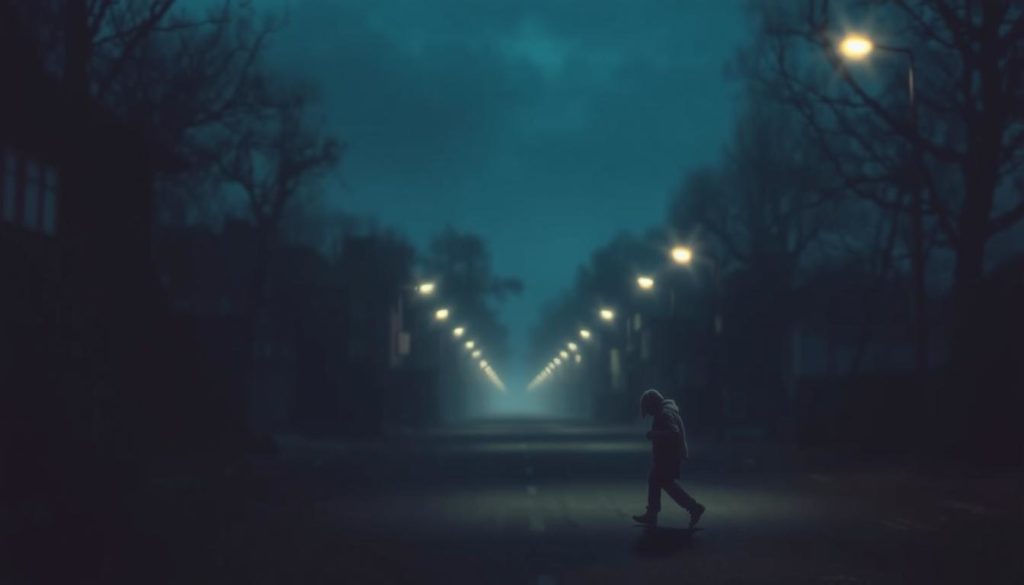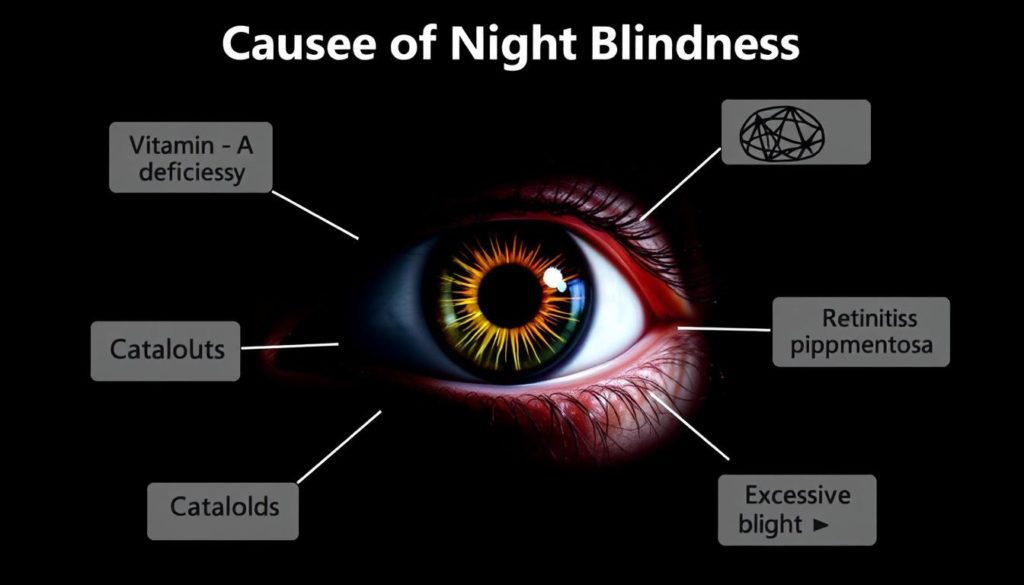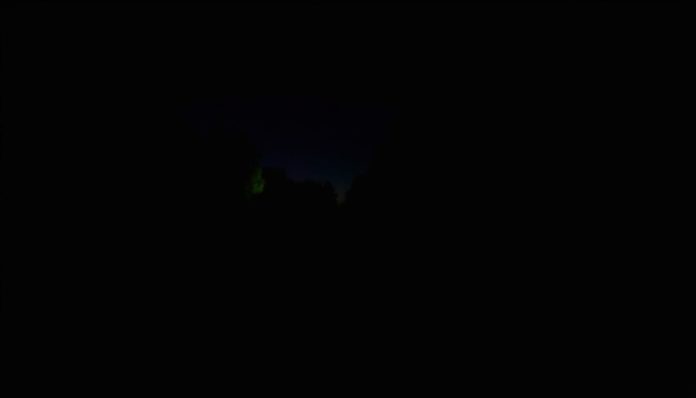Did you know nearly 30 million Americans have night blindness? This shows how common and serious night vision issues are. Night blindness makes it hard to see in the dark and can be dangerous, especially when driving at night.
We’re here to help you understand night blindness better. We’ll explore its causes, symptoms, and ways to improve your night vision. Knowing what causes night blindness is key to finding the right treatment and improving your sight.
Getting help and taking preventive steps can greatly improve your situation. If you or someone you know has night blindness, this guide is here to help. It offers important tips to deal with night blindness.
What Is Night Blindness?
Night blindness, also known as nyctalopia, makes it hard to see in the dark. It can make everyday tasks like driving at night or walking in dim places tough.

There’s a big difference between not seeing anything in the dark and seeing poorly. Some people can’t see at all in the dark. Others see things, but not very clearly. Both can make daily activities hard, especially if you need to see well.
Ever wondered What Is Night Blindness? It’s when your eyes can’t switch from bright to dark easily. This makes seeing in the dark hard. Many things can cause this, and we’ll look at them later.
Some people might just have a little trouble seeing at night. They might find it hard to spot road signs or see pedestrians. Others might have a harder time seeing, making simple tasks very difficult. Knowing the signs and how it affects your life is key to dealing with it.
Causes of Night Blindness
It’s important to know what causes night blindness. This helps doctors find the right treatment. Many things, like health issues, genes, and not getting enough nutrients, can cause it.
Medical Conditions Leading to Night Blindness
Some health problems can make it hard to see at night. For example, retinitis pigmentosa is a genetic disorder that harms the retina. Cataracts, which cloud the lens, are another common cause. These issues are big reasons for night blindness.

Genetic Factors Affecting Night Vision
Genetics also play a big part in night blindness. If your family has it, you might get it too. Conditions like congenital stationary night blindness can be passed down. Early testing and genetic advice are important for managing it.
Deficiency in Essential Nutrients
Not getting enough nutrients can also cause night blindness. Vitamin A is especially important for good vision. Eating foods rich in nutrients helps prevent night blindness and keeps your eyes healthy.
Common Symptoms of Nyctalopia
Feeling symptoms of nyctalopia can be unsettling and disrupt daily life. Spotting these symptoms early helps manage the condition better.
Struggling to See in Low Light
Difficulty seeing in the dark or low light is a common symptom. People may find it hard to move around in dim places, like movie theaters or dark streets. This is because their eyes can’t adjust fast from bright to low light.
Challenges with Night Driving
Driving at night is tough for those with nyctalopia. They face:
- Glare from oncoming headlights, which can be blinding and disorienting.
- Can’t read road signs clearly, making it hard to navigate.
- Have trouble judging distances, which can lead to dangerous driving.
Other Vision Impairment Signs
There are other signs of vision problems that might mean night blindness, like:
- Need a long time to adjust when moving from bright to dim places.
- See halos around lights, especially in the dark.
- Have blurry or hazy vision in the dark, making everyday tasks hard.
Spotting and dealing with these symptoms early can greatly improve life for those affected.
How to Diagnose Night Blindness
Figuring out if you have night blindness takes a few steps. You need both eye exams and talks with eye specialists. These steps are key to finding out what’s going on.
Eye Exams and Medical Tests
An eye specialist might run many tests to find out if you have night blindness. First, you’ll get a full eye exam. This exam checks your eye health and how well you see.
They might also suggest an electroretinography test. This test checks how your eyes react to light. It helps find problems in the retina that could cause night blindness. Other tests look at how your pupils react to light and dark, making sure they check your night vision well.
Consulting with an Eye Specialist
Talking to an ophthalmologist or optometrist is crucial for a correct diagnosis and treatment. They know how to find the cause of your vision issues. They can suggest the best treatment, like glasses, vitamins, or other therapies.
Treatment for Night Blindness
Fixing night blindness starts with finding the root cause. Nutritional supplements are a key part of the solution. For example, Vitamin A supplements are crucial for treating night blindness caused by a lack of it. Eating foods high in Vitamin A, like carrots, spinach, and sweet potatoes, can greatly help your night vision.
When night blindness is linked to cataracts, surgery might be needed. Cataract surgery can clear up your vision, making it easier to see at night. Talking to an eye doctor to see if surgery is right for you is a big step in fighting night blindness.
Making some lifestyle changes can also help with night blindness. These include:
- Wearing glasses or contact lenses that help with night vision.
- Using good lighting at night to avoid eye strain.
- Going for regular eye exams to keep an eye on changes and adjust treatments.
By trying these methods, you can see a big difference in your daily life. Each approach should fit your unique situation, creating a complete plan to boost your night vision.
Effective Night Blindness Prevention
Preventing night blindness is possible with the right steps. By making certain lifestyle and diet choices, you can lower the risk of nyctalopia. This helps keep your eyes healthy.
Maintaining a Healthy Diet
Eating well is key for your eyes. Foods high in Vitamin A are essential. Carrots, sweet potatoes, spinach, and fish are great choices. They provide Vitamin A and antioxidants, vital for your eyes at night.
Eye Care Practices
Good eye care is vital for your vision. Always wear sunglasses with UV protection. Also, quitting smoking helps prevent eye diseases. These habits are good for your eye health.
Regular Medical Check-ups
Seeing your doctor regularly is crucial. It helps catch eye problems early. Going for annual eye exams can prevent night blindness.
Living with Night Vision Problems
Adjusting to life with night vision problems can be tough. But, there are ways to make life better. Activities like driving at night or moving in dim places can be safer with a few changes.
For those who struggle to see in the dark, it’s key to use helpful tools and find community support. Here are some tips to help you deal with these issues:
- Use Adequate Lighting: Make sure your home and work areas are well-lit. Motion-sensor lights are great for dark spots like hallways and stairs.
- Emotional and Social Support: Join support groups or online forums to connect with others. Sharing stories can help you feel better and learn new things.
- Coping Strategies: Create a routine that includes enough light for important tasks. This can help avoid accidents.
Community resources and support groups are also very important. They offer help like vision screenings and workshops. Organizations like the American Foundation for the Blind can be a big help.
| Adjustment | Benefit |
|---|---|
| Enhanced Lighting | Reduces risk of falls and accidents |
| Support Groups | Emotional wellbeing and shared advice |
| Routine Planning | Safer navigation during low-light conditions |
Living with night vision problems doesn’t have to hold you back. By making these changes and seeking help, you can manage seeing in the dark better. Remember, you’re not alone, and with the right steps, you can still live a fulfilling life despite vision challenges.
Tips for Managing Difficulty Seeing in the Dark
Seeing well in the dark is key for safety and freedom. Here are some tips to help you see better in low light and enjoy nighttime activities more.
Using Adequate Lighting
Optimizing lighting is a great way to tackle night blindness. Here are some tips:
- Install Night Lights: Night lights in hallways, bathrooms, and near stairs can prevent accidents.
- Use Motion Sensors: These lights turn on when you move, saving energy and improving visibility.
- Adjustable Lamps: Desk and floor lamps with adjustable brightness are great for detailed tasks.
- Smart Lighting Systems: Smart bulbs adjust brightness automatically, based on time and activity.
Driving Tips for Night Time
Night driving is tough if you have trouble seeing in the dark. Here are some tips to stay safe:
- Use Anti-Reflective Glasses: Glasses with an anti-reflective coating reduce glare from headlights.
- Keep Windshields and Mirrors Clean: Clean windshields, mirrors, and headlights for better visibility.
- Dim Dashboard Lights: Lower dashboard light brightness to reduce distractions.
- Stay in Well-Lit Areas: Choose well-lit routes and avoid dark streets and intersections.
- Take Regular Breaks: Fatigue can hurt your vision; take breaks to stay alert.
Assistive Devices and Tools
There are many tools to help with night blindness. Here are some options:
- Night Vision Glasses: These glasses improve contrast and vision in low light.
- Portable LED Lights: Small LED lights can illuminate dark areas when needed.
- Handheld Magnifiers with Light: Magnifiers with lights help with reading and close-up tasks in the dark.
- Canes with LED Lights: Canes with LED lights offer extra light and safety for those with severe night blindness.
By following these tips, using the right lighting, and using assistive devices, you can improve your life in the dark. You’ll feel more confident and safe at night.
Dietary Adjustments for Improved Night Vision
Improving your night vision starts with what you eat. Certain foods and nutrients are key for better eye health. This section will explore the best foods for night vision.
Foods Rich in Vitamin A
Vitamin A is vital for your eyes, especially in the dark. Eating foods high in Vitamin A can help your vision in low light. Here are some great sources:
- Carrots
- Sweet Potatoes
- Spinach
- Butternut Squash
- Kale
Other Nutrients for Eye Health
Other nutrients are also important for eye health and night vision. Omega-3 fatty acids, antioxidants, and more are crucial. Here’s a look at some key nutrients and their benefits:
| Nutrient | Benefits for Eye Health | Food Sources |
|---|---|---|
| Omega-3 Fatty Acids | Reduces Dry Eye Syndrome | Salmon, Flax Seeds, Walnuts |
| Vitamin C | Protects against Macular Degeneration | Oranges, Broccoli, Bell Peppers |
| Zinc | Aids in Vitamin A Transport | Oysters, Beef, Pumpkin Seeds |
By adding these foods to your diet, you can support your eye health. This helps you see better in the dark.
Advanced Treatments and Therapies
New discoveries in vision science have brought exciting treatments for night blindness. Gene therapy and retinal implants are leading the way.
Gene therapy aims to fix the genetic problems causing night blindness. Scientists work on replacing or fixing the faulty genes. Early trials show great promise, offering a possible cure.
Retinal implants are like high-tech prosthetics for the eye. They help by sending light signals to the brain, improving night vision. This technology is getting better, offering hope for a better life for those with nyctalopia.
Here’s a quick look at the latest breakthroughs:
| Advanced Treatments | Benefits |
|---|---|
| Gene Therapy | Targets genetic causes, potential for permanent solution |
| Retinal Implants | Bypasses damaged cells, restores vision clarity |
These new treatments for night blindness give us hope. They show how far medical science has come. With more research, the future looks bright for those seeking therapies for nyctalopia.
When to Seek Help for Impaired Vision at Night
Dealing with night blindness can be tough, especially when it affects daily tasks like driving. It’s important to know when to get help for vision problems at night. If you struggle to see in the dark or find it hard to do things you used to do easily, it’s time to act.
Start tracking your symptoms to help your eye specialist. Keep a record of when poor night vision is a problem. This info is key when you see an eye doctor. Eye exams can spot underlying issues and lead to better treatments.
Ignoring night vision issues can make them worse over time. So, take action early. Make regular eye exams and medical check-ups a part of your routine. If your night vision gets worse, see an eye specialist. They can help you find treatments that improve your life and safety at night.
FAQ
What is night blindness?
Night blindness, or nyctalopia, is when people struggle to see in the dark. It can be mild or severe, making it hard to see in low light.
What are the common causes of night blindness?
Many things can cause night blindness. This includes eye diseases, genetics, and not getting enough nutrients. Common causes include retinitis pigmentosa, cataracts, and Vitamin A deficiency.
What are the symptoms of nyctalopia?
Symptoms include trouble seeing in the dark and problems with night driving. It can also make it hard to adjust to light changes.
How is night blindness diagnosed?
Doctors use eye exams and tests like electroretinography to diagnose night blindness. Seeing an eye specialist is key for a correct diagnosis.
What treatments are available for night blindness?
Treatments depend on the cause. They can include supplements, surgery for cataracts, and lifestyle changes.
How can I prevent night blindness?
To prevent it, eat a diet rich in Vitamin A and antioxidants. Also, protect your eyes from UV rays and get regular eye exams.
What adjustments can I make for living with night vision problems?
Adjustments include using better lighting at home and assistive devices. Also, get support from community resources and loved ones.
What tips can help manage difficulty seeing in the dark?
Use enough light, drive safely at night, and use tools for low light. These can help you navigate better in the dark.
Are there any dietary adjustments that can improve night vision?
Yes, eating foods rich in Vitamin A and Omega-3 fatty acids helps. Carrots, sweet potatoes, and fish are good for your eyes.
What advanced treatments and therapies are available for night blindness?
New treatments include gene therapy and retinal implants. Recent research offers hope for those with night vision problems.
When should I seek help for impaired vision at night?
If you have trouble seeing in the dark, can’t drive at night, or have vision problems, seek help. An eye specialist can help diagnose and treat your condition.


